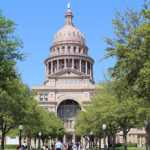AUSTIN—Dozens of Texans testified before the Senate Education Committee on a bill proponents hailed as school choice but which critics called a voucher scheme that would violate religious liberty and undermine public education.
SB 3 by Sen. Larry Taylor, R-Friendswood, would create educational savings accounts and tax credit scholarships. The programs would use public funds to benefit parents who want to enroll their children in private or charter schools, including parochial schools, or pay for homeschooling expenses.
“This is just a choice. It’s another option. We’re not trying to decimate anybody,” Taylor said in response criticism his bill would harm public schools. “This is competition to a healthy degree.”
Negative impact on public schools that accept all students
John Ogletree, pastor of Metropolitan Baptist Church in Houston and longtime board member of the Cypress-Fairbanks Independent School District, signed on about 8 a.m. to testify against SB 3 at the March 21 hearing. But Ogletree said he “left disappointed” around 5:30 p.m. to return to Houston before having the opportunity to testify.
The Senate Education Committee heard testimony for about an hour at 9 a.m. before the full Senate convened, and then the committee resumed public hearings mid-afternoon and continued late into the evening.
The next day, Ogletree expressed regret he did not have the opportunity to let the senators know the negative impact the bill potentially could have on students in his school district and other public schools.
“I wanted them to look at what harm it could do to school districts that are trying to provide the best education possible for all students,” he said.
“We know this is not about helping minority students get into private schools. It’s a panacea for the private schools and for the upper-middle-class families who can afford them.”
Sign up for our weekly edition and get all our headlines in your inbox on Thursdays
Concerns about religious liberty
Gus Reyes, director of the Texas Baptist Christian Life Commission, finally testified about 9:30 p.m., citing religious liberty concerns about the bill.
“The mission of most private religious schools is inherently different from public schools and should be supported through voluntary contributions, not state coercion,” Reyes said. “We support parents’ right to choose the best educational setting for their children, but we do not believe in using state funds to support private religious education.”
Charles Luke with the Coalition for Public Schools and Pastors for Texas Children likewise expressed concerns about public taxpayer funds being redirected to private religious education.
“We have some huge concerns about that because taxpayer funds are going to be used for religious content,” he said. “It can be religious content of all kinds and all manner.”
Luke noted concern the legislation would violate both the “free exercise” and “no establishment” clauses of the First Amendment to the U.S. Constitution.
Homeschooling groups lined up on opposite sides of the bill. Representatives of the Texas Homeschool Coalition supported it, calling it a victory for parental rights, while leaders of Texans for Homeschool Freedom opposed it, saying it opens the door to state regulation of their curriculum.
Civil rights and civil wrongs
SB 3 drew support from advocates for private schools. Some echoed the language of Gov. Greg Abbott and Lt. Gov. Dan Patrick, who have framed the measure as a “civil rights issue,” protecting the rights of parents to choose how to educate their children.
David Hinojosa, policy director for the San Antonio-based Intercultural Development Association, countered by characterizing voucher-style programs without strict safeguards as “more civil wrongs than civil rights” because they fail to meet the needs of low-income students, particularly minority students.
“They are segregating students based on race and national origin, and they are not leading to an increase in student achievement,” he said, citing studies from other states with similar programs.
Editor’s Note: The Senate Education Committee voted 7-3 on March 23 to approve SB 3. Sen. Kel Seliger, R-Amarillo; Carlos Uresti, D-San Antonio; and Royce West, D-Dallas, cast the three “no” votes.














We seek to connect God’s story and God’s people around the world. To learn more about God’s story, click here.
Send comments and feedback to Eric Black, our editor. For comments to be published, please specify “letter to the editor.” Maximum length for publication is 300 words.